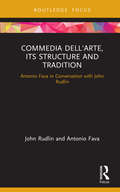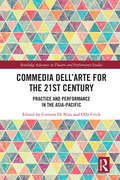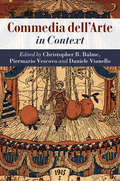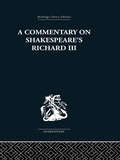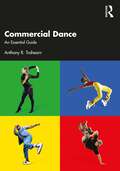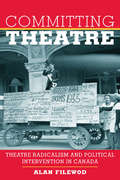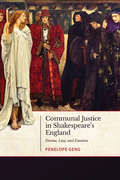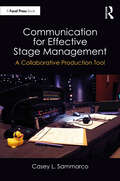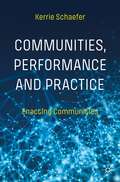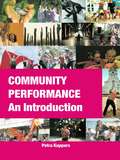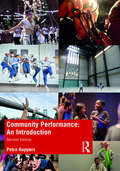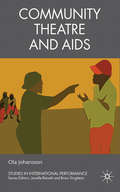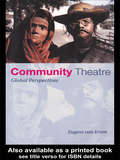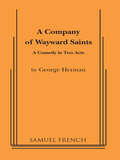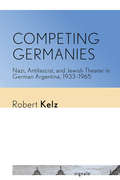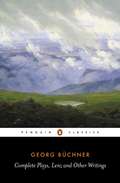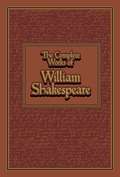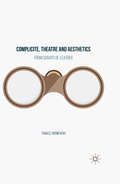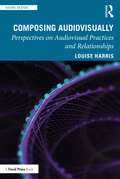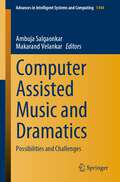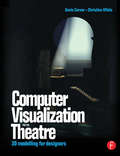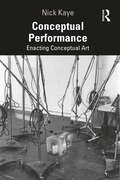- Table View
- List View
Commedia dell'Arte, its Structure and Tradition: Antonio Fava in Conversation with John Rudlin
by John Rudlin Antonio FavaCommedia dell'Arte, its Structure and Tradition chronicles a series of discussions between two renowned experts in commedia dell'arte – master practitioners Antonio Fava and John Rudlin. These discussions were recorded during three recent visits by Fava to Rudlin’s rural retreat in south west France. They take in all of commedia dell'arte's most striking and enduring elements – its masks, its scripts and scenarios, and most outstandingly, its cast of characters. Fava explores the role of each stock Commedia character and their subsequent incarnations in popular culture, as well as their roots in prominent figures of their time. The lively and wide-ranging conversations also take in methods of staging commedia dell'arte for contemporary audiences, the evolution of its gestures, and the collective nature of its theatre-making. This is an essential book for any student or practitioner of commedia dell'arte – provocative, expansive wisdom from the modern world's foremost exponent of the craft.
Commedia dell’Arte for the 21st Century: Practice and Performance in the Asia-Pacific (Routledge Advances in Theatre & Performance Studies)
by Olly Crick Corinna Di NiroThis book discusses the evolution of Commedia dell’Arte in the Asia-Pacific where through the process of reinvention and recreation it has emerged as a variety of hybrids and praxes, all in some ways faithful to the recreated European genre. The contributors in this collection chart their own training in the field and document their strategies for engaging with this form of theatre. In doing so, this book examines the current thoughts, ideas, and perceptions of Commedia – a long-standing theatre genre, originating in a European-based collision between neo-classical drama and oral tradition. The contributing artists, directors, teachers, scholars and theatre-makers give insight into working styles, performance ideas, craft techniques and ways to engage an audience for whom Commedia is not part of their day-to-day culture. The volume presents case studies by current practitioners, some who have trained under known Commedia ‘masters’ (e.g. Lecoq, Boso, Mazzone-Clementi and Fava) and have returned to their country of origin where they have developed their performance and teaching praxis, and others (e.g. travelling from Europe to Japan, Thailand, Singapore and China) who have discovered access points to share or teach Commedia in places where it was previously not known. This book will be of great interest to students and scholars in Performing arts, Italian studies, and History as well as practitioners in Commedia dell’Arte.
Commedia dell’Arte in Context (Literature In Context )
by Christopher B. Balme Piermario Vescovo Daniele VianelloThe commedia dell’arte, the ‘improvised’ Italian theatre that dominated the European stage from 1550 to 1750, is arguably the most famous theatre tradition to emerge from Europe in the early modern period. Its celebrated masks have come to symbolise theatre itself and have become part of the European cultural imagination. Over the past twenty years a revolution in commedia dell’arte scholarship has taken place, generated mainly by a number of distinguished Italian scholars. Their work, in which they have radically separated the myth from the history of the phenomenon, remains, however, largely untranslated into English. The present volume gathers together an international group of scholars to synthesise for the first time this research for both specialist and non-specialist readers. The book is structured around key topics that span both the early modern period and the twentieth-century reinvention of the commedia dell’arte.
Commentary on Shakespeare's Richard III
by Wolfgang ClemenFirst published in 1968. Providing a detailed and rigorous analysis of Richard III, this Commentary reveals every nuance of meaning whilst maintaining a firm grasp on the structure of the play. The result is an outstanding lesson in the methodology of Shakespearian criticism as well as an essential study for students of the early plays of Shakespeare.
Commercial Dance: An Essential Guide
by Anthony R. TrahearnThis is an exploration of the vital and rapidly evolving world of Commercial Dance, tracing the evolution and merging of Hip-Hop, Club and Jazz dance styles from the music videos of the early 1980s, to today's huge influence on pop music and dance in a multi-media culture. Chapters including ‘Iconic Moments’ and ‘Main Movers’ contextualise and analyse culturally significant works and choreographers. With direct contributions from an international array of industry leading dancers, choreographers and creatives - including JaQuel Knight (Beyonce’s choreographer), Rich + Tone Talauega (Madonna & Michael Jackson collaborators), Rebbi Rosie (Rihanna’s dancer), Dean Lee (Janet Jackson’s choreographer) and Kiel Tutin (BLACKPINK’s choreographer) - this book shines a light on the creatives in the Commercial Dance industry who have made significant impacts, not just on the world of dance but on popular culture itself. Chapters discussing dance history, copyright law, inclusivity and dance class culture as well as additional contributions from dance scholars enable this book to give credence to Commercial Dance as a legitimate academic area of study. This is a complete and comprehensive textbook for all dance students at any level of study on college, university or conservatory courses.
Committing Theatre: Theatre Radicalism and Political Intervention in Canada
by Alan FilewodCommitting Theatre offers the first full-length historical study of political intervention theatre and theatrical spectatorship in English Canada. Building on twenty years of research and engagement in the field, this book’s historical narrative frames close-up examples of how theatre artists have intervened in and engaged with political struggle from the mid-19th century to the present. Lumber-camp mock trials, Mayday parades and street protests, the Workers Theatre Movement, agitprop theatre, the counter-culture theatre of the 1960s and 1970s, and more recent anarchist theatre collectives all played a role in a vibrant and unique radical theatre culture that went largely unnoticed, unrecorded, and undocumented by the professional theatre establishment.
Communal Justice in Shakespeare’s England: Drama, Law, and Emotion
by Penelope GengThe sixteenth century was a turning point for both law and drama. Relentless professionalization of the common law set off a cascade of lawyerly self-fashioning – resulting in blunt attacks on lay judgment. English playwrights, including Shakespeare, resisted the forces of legal professionalization by casting legal expertise as a detriment to moral feeling. They celebrated the ability of individuals, guided by conscience and working alongside members of their community, to restore justice. Playwrights used the participatory nature of drama to deepen public understanding of and respect for communal justice. In plays such as King Lear and Macbeth, lay people accomplish the work of magistracy: conscience structures legal judgment, neighbourly care shapes the coroner’s inquest, and communal emotions give meaning to confession and repentance. An original and deeply sourced study of early modern literature and law, Communal Justice in Shakespeare’s England contributes to a growing body of scholarship devoted to the study of how drama creates and sustains community. Penelope Geng brings together a wealth of imaginative and documentary archives – including plays, sermons, conscience literature, Protestant hagiographies, legal manuals, and medieval and early modern chronicles – proving that literature never simply reacts to legal events but always actively invents legal questions, establishes legal expectations, and shapes legal norms.
Communication for Effective Stage Management: A Collaborative Production Tool
by Casey L. SammarcoCommunication for Effective Stage Management: A Collaborative Production Tool provides a comprehensive examination of communication theory through the lens of effective stage management and offers ideas and methods for stage managers to enhance their communicative presence throughout a theatrical process.This book offers new, extensive in-depth discussion of communication techniques and how these methods apply to the role of the theatrical stage manager as the facilitator of information. Part I dives into the methods and principles of business communication employed by stage managers and discusses how these techniques are best implemented throughout a theatrical process, all supported with real-life examples. It also offers discussion questions and resources to enhance the content and encourages the reader to self-analyze their own communication techniques during the production process. Part II contains excerpts from other industry professionals who offer their own unique perspective as to the collaborative and communicative work of stage managers and how their own artistic careers are impacted by the communication systems of a stage management team.This book is best suited for advanced stage management students, professional theatre practitioners, and theatrical educators.
Communities, Performance and Practice: Enacting Communities
by Kerrie SchaeferThis book examines how a predominantly negative view of community has presented a challenge to critical analysis of community performance practice. The concept of community as a form of class-based solidarity has been hollowed out by postmodernism’s questioning of grand narratives and poststructuralism’s celebration of difference. Alongside the critique of a notion of community has been a critical re-signification of community, following the thinking of philosopher Jean-Luc Nancy who conceives of community not as common being but as being-in-common. The concept of community as being-in-common generates questions that have been taken up by feminist geographers, J.K. Gibson-Graham, in theorising a post-capitalist approach to community-based development. These questions and approaches guide the analyses in researched case studies of community performance practice. The book revises theoretical debates that have defined the field of community theatre and performance. It asks how the critical re-signification of community aligns with these debates and, at the same time, opens new modes of critical analysis of community theatre and performance practice.
Community Performance: An Introduction
by Petra KuppersCommunity Performance: An Introduction is a comprehensive and accessible practice-based primer for students and practitioners of community arts, dance and theatre. It is both a classroom-friendly textbook and a handbook for the practitioner, perfectly answering the needs of a field where teaching is orientated around practice. Offering a toolkit for students interested in running community arts groups, this book includes: international case-studies and first person stories by practitioners and participants sample exercises, both practical and reflective study questions excerpts of illustrative material from theorists and practitioners. This book can be used as a standalone text or together with its companion volume, The Community Performance Reader, to provide an excellent introduction to the field of community arts practice. Petra Kuppers has drawn on her vast personal experience and a wealth of inspiring case studies to create a book that will engage and help to develop the reflective community arts practitioner.
Community Performance: An Introduction
by Petra KuppersCommunity Performance: An Introduction is a comprehensive and accessible practice-based primer for students and practitioners of community arts, dance, and theatre, offering reflection on the ethical issues inherent to the field. It is both a classroom-friendly textbook and a handbook for the practitioner, perfectly answering the needs of a field where teaching is orientated around practice. Offering a toolkit for students interested in running community arts groups or community performance events, this book includes: international case studies and first-person stories by practitioners and participants sample exercises, both practical and reflective study questions excerpts of illustrative material from theorists and practitioners This second edition has been completely revised with over 25% new content to bring the book up to date with developments in both society and performance, including the rise of social media, updates in the contexts of social justice, new standards and norms in social practice, and the changing faces of funding, evaluation, and professional development. The book can be used as a standalone text or together with its companion volume, Community Performance: A Reader, to provide an excellent introduction to the field of community arts practice.
Community Theatre and AIDS (Studies in International Performance)
by Ola JohanssonApplying research into assessments of community theatre, epidemiology, and young people's shared and private stories using a wide range of methodologies, this book explores the potential efficacy of community theatre to prevent the spread of HIV/AIDS in Tanzania with reference to several other comparable sites in Africa.
Community Theatre: Global Perspectives
by Eugene van ErvenCommunity theatre is an important device for communities to collectively share stories, to participate in political dialogue, and to break down the increasing exclusion of marginalised groups of citizens. It is practised all over the world by growing numbers of people. Published at the same time as a video of the same name, this is a unique record of these theatre groups in action. Based on van Erven's own travels and experiences working with community theatre groups in six very different countries, this is the first study of their work and the methodological traditions which have developed around the world.
Como me gustaría que me hubiera conocido
by Gilberto Santos¿Sería posible enamorarse de alguien que ya se fue? Lucas y Lauro nunca se conocieron, no en esta vida ... Pero lo que sólo sería un viaje de vacaciones descomprometidas en el interior de São Paulo da un giro y revive la vida de Lauro, un psicólogo siempre dispuesto a ayudar. Sus creencias se ponen a prueba en medio de acontecimientos que desafían la lógica. Después de verse envuelto en un misterioso suicidio que sacudía la pequeña ciudad de Vinhedo, su ayuda a la familia del muerto no terminaría tan pronto; y luego lauro estaría envuelto y enamorado de Lucas. Del otro lado, sin saberlo, estaría también ayudando a su alma gemela a elevarse espiritualmente. Acompañe y emociónese con esta historia, que no deja dudas de que la muerte es sólo un viaje y de que las almas gemelas realmente existen.
Company Of Wayward Saints
by George HermanComedy / 6m, 3f / Platform stage / The company is a commedia dell' arte group who wander by mistake into the eye of an allegory. They are humanity, wayward saints all, who are far from home and without means. A nobleman may be their salvation if they can put on a good show for him. Surprisingly, the Company chooses to present the history of man, from the Garden of Eden through Everyman in birth, adolescence, marriage and death. Along the way they enact other wayward adventures such as the assassination of Julius Caesar and the homecoming of Odysseus. It is a fine mosaic of life redeemed by humor and human understanding.
Competing Germanies: Nazi, Antifascist, and Jewish Theater in German Argentina, 1933–1965 (Signale: Modern German Letters, Cultures, and Thought)
by Robert KelzFollowing World War II, German antifascists and nationalists in Buenos Aires believed theater was crucial to their highly politicized efforts at community-building, and each population devoted considerable resources to competing against its rival onstage. Competing Germanies tracks the paths of several stage actors from European theaters to Buenos Aires and explores how two of Argentina's most influential immigrant groups, German nationalists and antifascists (Jewish and non-Jewish), clashed on the city's stages. Covered widely in German- and Spanish-language media, theatrical performances articulated strident Nazi, antifascist, and Zionist platforms. Meanwhile, as their thespian representatives grappled onstage for political leverage among emigrants and Argentines, behind the curtain, conflicts simmered within partisan institutions and among theatergoers. Publicly they projected unity, but offstage nationalist, antifascist, and Zionist populations were rife with infighting on issues of political allegiance, cultural identity and, especially, integration with their Argentine hosts.Competing Germanies reveals interchange and even mimicry between antifascist and nationalist German cultural institutions. Furthermore, performances at both theaters also fit into contemporary invocations of diasporas, including taboos and postponements of return to the native country, connections among multiple communities, and forms of longing, memory, and (dis)identification. Sharply divergent at first glance, their shared condition as cultural institutions of emigrant populations caused the antifascist Free German Stage and the nationalist German Theater to adopt parallel tactics in community-building, intercultural relationships, and dramatic performance.Its cross-cultural, polyglot blend of German, Jewish, and Latin American studies gives Competing Germanies a wide, interdisciplinary academic appeal and offers a novel intervention in Exile studies through the lens of theater, in which both victims of Nazism and its adherents remain in focus.
Competition Piece
by John WellsComedy, Short Play /10-21 m or f / Bare stage / This clever comedy is an ideal high school competition play. Three groups of students are preparing for a drama competition. One has lots of rehearsal time and chooses a romance. The meatheads decide to do a typical teen problem play. The arty clique wants to do a one act version of King Lear as a Japanese Noh drama. Winner of several competitions, this play is certain to delight your students, your audience and those hard to please judges.
Complete Plays, Lenz and Other Writings
by Georg BuchnerCollected in this volume are powerful dramas and psychological fiction by the nineteenth-century iconoclast now recognized as a major figure of world literature. Also included are selections from Büchner's letters and philosophical writings.
Complete Works of William Shakespeare: The Cambridge Text From The Latest Edition Of William Aldis Wright... (Leather-bound Classics)
by William Shakespeare Michael A. CramerRomeo and Juliet, A Midsummer Night's Dream, King Lear, Hamlet, and Macbeth-the works of William Shakespeare still resonate in our imaginations four centuries after they were written. The timeless characters and themes of the Bard's plays fascinate us with their joys, struggles, and triumphs, and now they are available in a special volume for Shakespeare fans everywhere.This Canterbury Classics edition of William Shakespeare's works includes all of his poems and plays in an elegant, keepsake edition. Whether for a Shakespeare devotee or someone just discovering him, this is the perfect place to experience the drama of Shakespeare's words. A scholarly introduction provides additional context and insight into the poems and plays.Lexile score: NP
Complicite, Theatre and Aesthetics: From Scraps of Leather
by Tomasz WiśniewskiThis book presents a pioneering critical study of Complicite's work throughout the years. Drawing on an extensive overview of the available research material - including interviews, manuscripts and the company's own archive - the book is framed within a clearly defined research perspective and explores the singularity of theatre communication. The book results from an encounter between the London-based - but cosmopolitan in scope - company, and a fresh application of the form-oriented scholarship of Eastern Europe, Yuri Lotman's semiosphere in particular. Focused on the aesthetics of Complicite, this study achieves a critical distance and undertakes multidimensional scrutiny of the available research material. By identifying the principles of Complicite's aesthetics, the book attempts to grasp the company's artistic paradigm. It focuses on ways of creating, preserving, and decoding meanings, rather than on the nuances of performance or contextual issues.
Composing Audiovisually: Perspectives on audiovisual practices and relationships (Sound Design)
by Louise HarrisWhat does the Coen Brothers’ Barton Fink have in common with Norman McLaren’s Synchromy? Or with audiovisual sculpture? Or contemporary music video? Composing Audiovisually interrogates how the relationship between the audiovisual media in these works, and our interaction with them, might allow us to develop mechanisms for talking about and understanding our experience of audiovisual media across a broad range of modes. Presenting close readings of audiovisual artefacts, conversations with artists, consideration of contemporary pedagogy and a detailed conceptual and theoretical framework that considers the nature of contemporary audiovisual experience, this book attempts to address gaps in our discourse on audiovisual modes, and offer possible starting points for future, genuinely transdisciplinary thinking in the field.
Computer Assisted Music and Dramatics: Possibilities and Challenges (Advances in Intelligent Systems and Computing #1444)
by Ambuja Salgaonkar Makarand VelankarThis book is intended for researchers interested in using computational methods and tools to engage with music, dance and theatre. The chapters have evolved out of presentations and deliberations at an international workshop entitled Computer Assisted Music and Dramatics: Possibilities and Challenges organized by University of Mumbai in honour of Professor Hari Sahasrabuddhe, a renowned educator and a pioneering computational musicologist (CM) of Indian classical music. The workshop included contributions from CM as well as musicians with a special focus on South Asian arts. The case studies and reflective essays here are based on analyses of genres, practices and theoretical constructs modelled computationally. They offer a balanced and complementary perspective to help innovation in the synthesis of music by extracting information from recorded performances. This material would be of interest to scholars of the sciences and humanities and facilitate exchanges and generation of ideas.
Computer Visualization for the Theatre: 3D Modelling for Designers
by Gavin Carver Christine WhiteTheatre designers using 3D software for computer visualisation in the theatre will find this book both a guide to the creative design process as well as an introduction to the use of computers in live performance. Covering the main software packages in use: Strata Studio Base, 3D Studio Max and 3D Studio Viz, the book provides techniques for 3D modelling alongside creative ideas and concepts for working in 3D space. Projects are provided to sharpen your awareness and digital skills as well as suggested further reading to broaden the scope of your theatrical and design knowledge. This book is both a useful day to day reference as well as an inspirational starting point for implementing your own ideas. The authors are experienced trainers in the field and understand the pitfalls to be avoided as well as the possibilities to be explored using computer visualisation for designing theatre space. They provide insightful hands on descriptions of techniques used in the development of performance projects set in the wider context of design considerations. The book is highly informative about the technology of computer visualisation providing examples of working practice applicable to all software.
Conceptual Performance: Enacting Conceptual Art
by Nick KayeConceptual Performance explores how the radical visual art that challenged material aesthetics in the 1960s and 1970s tested and extended the limits, character and concept of performance. Conceptual Performance sets out the history, theoretical basis, and character of this genre of work through a wide range of case studies. The volume considers how and why principal modes and agendas in Conceptual art in the 1960s and 1970s necessitated new engagements with performance, as well as expanded notions of theatricality. In doing so, this book reviews and challenges prevailing histories of Conceptual art through critical frameworks of performativity and performance. It also considers how Conceptual art adopted and redefined terms and tropes of theatre and performance: including score, document, embodiment, documentation, relic, remains, and the narrative recuperation of ephemeral work. While showing how performance has been integral to Conceptual art’s critiques of prevailing assumptions about art’s form, purpose, and meaning, this volume also considers the reach and influence of Conceptual performance into recent thinking and practice. This book will be of interest to scholars and students of theatre, performance, contemporary art, and art history.
